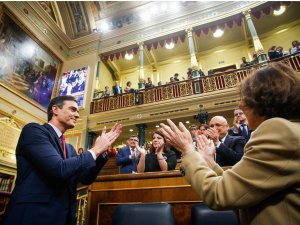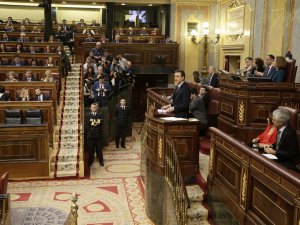Socialist (PSOE) leader Pedro Sánchez has been officially voted in as Spanish Prime Minister on Tuesday, after a second round vote gave him 167 votes in favour, 165 against, and with 18 abstentions in the 350-seat Spanish Congress. A simple majority was required for this second round.
Sánchez, 47, will now lead the first ever coalition government in Spain, the eurozone’s fourth-largest economy, with the left-wing Podemos group.
ALSO READ: Pedro Sánchez and Pablo Iglesias set out coalition agreement

It follows a two day debate over the weekend and the first round of voting, in which Sánchez secured 166 ‘yes’ votes with 165 against, and 18 abstentions. The first round required an overall majority: 176 or more ‘yes’ votes.
Pedro Sánchez initially came to power in June 2018 after pushing out his right-wing People’s Party (PP) predecessor Mariano Rajoy in a no-confidence vote. However, he was then forced to call an inconclusive election in April after Catalan pro-independence groups refused to back his draft budget. Spain remained in a political gridlock for most of 2019 after a second inconclusive general election in November.
ALSO READ: ERC party gives green light for Pedro Sánchez investiture
Sánchez and Pablo Iglesias, leader of the Podemos party, officially presented their coalition agreement on Monday 30 December.
The PSOE’s 120 seats from the 10 November general election, combined with the 35 won by the left-wing Podemos party, had left them short of the majority in the Spanish Congress. The re-election of Sánchez as prime minister had been mainly in the hands of the Catalan pro-independence Esquerra Republicana (ERC) party’s 13 MPs abstaining in the voting, as well as the support from other smaller political groups.
ALSO READ: The far-right and Catalonia mark the end of the election campaign
The PSOE-Podemos coalition agreement – Coalición progresista. Un nuevo acuerdo para España (Progressive coalition. A new deal for Spain) – pledges to lift the minimum wage, raise taxes on higher earners and large businesses, and repeal elements of Spain’s controversial 2012 labour market reforms that made it easier to fire workers.

Meanwhile, as part of the deal to secure the abstention of the ERC MPs, the ERC-PSOE agreement sets out the creation of a bilateral negotiating table between the Spanish and Catalan governments up to 15 days after the formation of the Spanish government and states that ‘political means’ should be favoured whilst ‘overcoming the judicialization’ of the Catalan independence conflict.
ALSO READ: Franco removed, but ‘Francoism still very present’ argue many
On Saturday the ERC party stated that they would maintain their agreement to abstain, despite the news on Friday that Spain’s Electoral Authority (JEC) has ordered Catalan president Quim Torra be disqualified from his post.
This was also followed by news that the electoral board has decided to not grant jailed pro-independence ERC leader Oriol Junqueras his MEP seat, despite being elected by citizens on the 2019 European election and being granted immunity as such by the EU court in December 2019.

ALSO READ: Puigdemont, Junqueras, Comín now officially recognised as MEPs
‘We need to resume the political dialogue, where grievances began to pile up, we need to leave the judicialisation of the conflict [with Catalonia] behind,’ Sánchez stated during his opening speech on Saturday in the Spanish Congress.
‘This progressive coalition is the best antidote against this coalition of the apocalypse,’ Sánchez also said at the weekend in reference to Spain’s right-wing People’s Party (PP) and Ciudadanos (Cs), and far-right Vox party, who all accuse him of putting Spain’s national unity at risk with his deal with Catalan separatists.
PP leader Pablo Casado has accused Sánchez of forming a ‘Frankenstein government’ made up of ‘communists’ and ‘separatists’ who ‘want to put an end to Spain’. He has also warned that the government the Socialist leader is proposing would be unable to govern and not last the full four years.
ALSO READ: Sánchez ‘rollercoaster’ and Spain’s ‘political instability
Click here for all articles and updates the Catalan Trial, verdicts and sentencing
